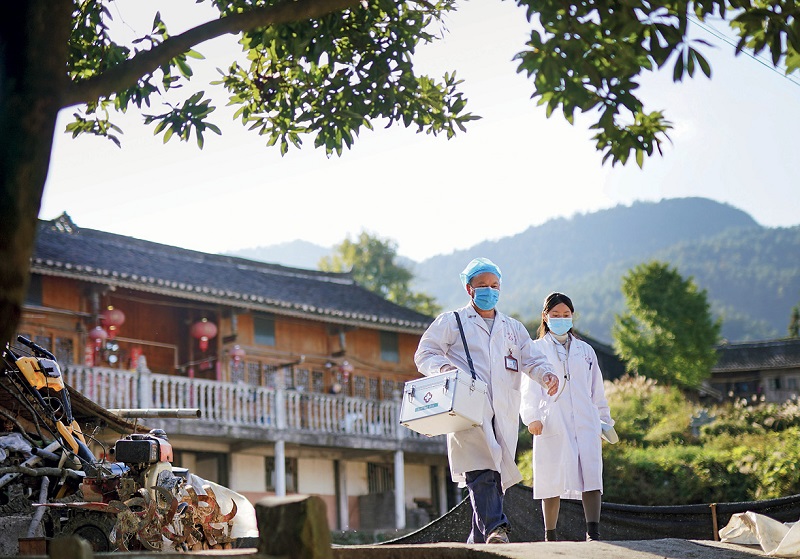| Voice |
| Cultivating the human rights garden | |
|
|
 Family doctors are conducting their work of diagnosing diseases and prescribing treatments at Zhangliang Village of Longquan Town, Danzhai County in southeast Guizhou Province, on October 30, 2023. When contemplating human rights, the principle of individual freedom often comes to the forefront. The Chinese government’s perception, however, consists in the more organic concept of a metaphorical garden, wherein human rights flourish by virtue of China’s unique soil – its rich history, ancient culture, and political system. China, as a seasoned gardener, thus endeavors, under the leadership of President Xi Jinping, to develop human rights based on its national conditions. This innovative approach evokes a broader perspective, one that integrates human rights with national development, in all its social, cultural, economic, and environmental aspects. Its aim is to explore alignment of the garden metaphor with President Xi’s vision of human rights, as reflected in a modernization model imbued with distinct Chinese characteristics. In China's historical and cultural context, traditions and values representing the legacy of Confucius and Laozi (or Lao Tseu) have direct bearing on the country's political philosophy. Such values underscore social harmony, and the importance accorded to the collective over the individual, as core principles of China’s approach to human rights. In combining traditions with socialist principles, China honors its national characteristics on the journey to modernization. The goal is a prosperous, culturally rich, and ethical society.
A chef instructor is teaching culinary skills at a Chinese cuisine class held by Xinyu Kangzhan Technical School at the city’s employment and entrepreneurship service center in Xinyu, Jiangxi Province, on June 22, 2022. On the social level, China strives to improve income distribution, boost per capita income, and expand the middle class. In tackling the challenges of pension reform, characterized by universal reform of the pension system, China enacts, through targeted adaptations, reforms that will culminate in a more sustainable and inclusive pension system. This entails diversifying funding sources and extending coverage to both casual and self-employed workers. Such efforts are expected to equip the system for future challenges. Significant healthcare policies, geared to improve public health facilities, include health system reform and expanded access to quality medical services. The effective response to the COVID-19 pandemic, evident in the rapid construction of specialized hospitals, is a clear testament to this commitment. Employment is acknowledged under China’s human rights perspective as a fundamental right that respects citizens’ dignity and quality of life. Employment itself, meanwhile, is regarded as a key pillar of economic and social stability. The Chinese government’s focus is hence on boosting and enhancing the quality and sustainability of employment. It is an approach which recognizes that both social welfare and economic growth are dependent on people's access to meaningful and reasonably remunerated work. As public sector reforms are critical in this context, improved working conditions and attracting talent are acknowledged as crucial to delivering efficient service to civil society. The focus on improving employment in such key sectors as technology, advanced manufacturing, and renewable energies, moreover, signifies the country’s commitment to future economic progress. Concurrent development of the right to flexible jobs is crucial to a dynamic labor market. The Chinese government strives to ensure job stability and a healthy balance between people’s professional and personal life, but at the same time underscoring the importance of adaptability in the digital age. Policies focusing on future re-skilling and continuous learning incentives are imperative to the workforce’s preparation for upcoming challenges and opportunities amidst rapid technological shifts. One suggestion in this regard is the relocation of workers to sustainable agriculture, waste management, and renewable energies. It is a strategy that not only addresses unemployment, but also contributes to food self-sufficiency and environmental sustainability.
Elderly people at Dongjie Village of Guangfu Town are queuing up to pick up their pensions from the local government office in Yongnian District of Handan City, Hebei Province, on September 26, 2023. Significant investment is earmarked for education aimed at enhancing the public system, especially in underdeveloped areas. In line with the global context, modernized education is crucial to maintaining China’s economic growth and status as a worldwide leader in innovation and technology. That in culture, meanwhile, will promote socialist values, whose importance to Chinese society is reflected in the country’s cohesive national identity. China looks to inclusive and sustainable growth, innovation, and expansion of high-tech sectors as sources of economic development, the benefits of which are exemplified in the infrastructure and rural revitalization projects throughout the country. China’s environmental approach underscores the pursuit of a harmonious coexistence between humanity and nature. The country is committed to remodeling industrial parks and intensifying pollution prevention and control, as well as to enhancing ecosystem diversity and sustainability. All are in the interests of achieving peak emissions and carbon neutrality. Internationally, China seeks to establish relationships that respect the country’s vision of human rights, and whose emphases are on peaceful development and global cooperation. Initiatives like the Belt and Road that promote new types of international relations serve as examples. In conclusion, China’s human rights vision under the leadership of the Communist Party of China, expressed through the metaphor of a carefully cultivated garden, highlights a distinctively holistic approach. As President Xi Jinping once stated, "Chinese Communists are keenly aware that only by integrating the basic tenets of Marxism with China’s specific realities and fine traditional culture and only by applying dialectical and historical materialism can we provide correct answers to the major questions presented by the times and discovered through practice and can we ensure that Marxism always retains its vigor and vitality." This quote encapsulates China’s singular approach to human rights, embodied in a fusion of universal ideals and profound respect for the country’s historical and cultural roots. Ronnie Lins is director of the China-Brazil Center for Research and Business. |
|
||||||||||||||||||||||||||||
|
